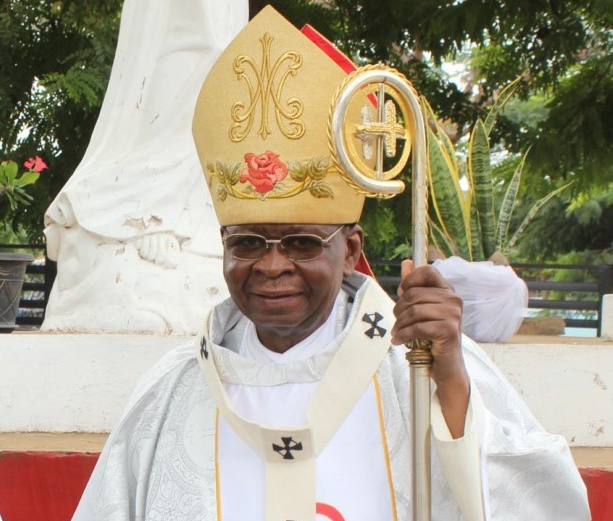By Paschal Norbert
TAMALE, APRIL 8, 2025 (CISA) — Most Rev Philip Naameh, the Archbishop of the Catholic Archdiocese of Tamale, Ghana, has announced the indefinite suspension of Fr Isaac Kelvin Minnow, citing a series of grave canonical violations, persistent disobedience to ecclesiastical authority, and unauthorized absence from ministry. The suspension, which took effect on April 3, 2025, will remain in place until Fr Minnow returns to the archdiocese and demonstrates genuine reform.
In a strongly worded letter addressed directly to the 36-year-old Fr Minnow, Archbishop Naameh detailed multiple unsuccessful efforts to address the priest’s conduct through fraternal correction and canonical procedures as outlined in canons 1339 and 1341 of the revised Book VI of the Code of Canon Law. He expressed disappointment that despite repeated attempts at pastoral engagement and correction, Fr Minnow had continued to act independently and in defiance of ecclesiastical authority.
Fr Minnow began his priestly formation in 2011 at St. Michael Major Seminary in Kaleo, located in the Upper West Region. In 2012, he transferred to St. Augustine’s Millennium Seminary in Tamale, where he pursued three years of philosophical studies.

In 2015, he advanced to St. Victor’s Major Seminary, where he undertook four years of theological studies, complemented by a year of pastoral experience at St. Kizito’s Parish in Kpandai. After successfully completing his seminary formation in and being ordained a deacon in 2020, he was ordained a Catholic priest on June 27 of the same year by the Metropolitan Archbishop of Tamale, Most Rev Philip Naameh.
In the suspension, a significant point of concern was Fr Minnow’s unauthorized absence from his assigned parish since January 2025. The Archbishop noted that the priest left his post without any prior communication or permission from either the parish priest or the Archbishop himself. This action, he said, constitutes a serious breach of canon law—specifically Canon 1396—which states that a cleric who gravely violates the obligation of residence tied to his office may be punished with just penalties, including removal from office.
Archbishop Naameh emphasized that Fr Minnow’s ongoing refusal to cooperate with ecclesiastical directives revealed a deliberate and public act of disobedience. He described the priest’s behaviour as demonstrating “gross disrespect, disregard, and disobedience” to his legitimate superior. The Archbishop stated that Fr Minnow’s refusal to attend administrative proceedings and heed multiple summons reflected a clear intention to defy the Church’s authority.
In response, Archbishop Naameh declared that Fr Minnow was suspended with immediate and indefinite effect. He invoked Canon 1333 §1 & 2, which provide for the removal or restriction of a priest’s rights to exercise any sacred office, ministry, or duty. As such, Fr Minnow is stripped of all faculties and authority related to his priestly functions and responsibilities.
Further, the Archbishop applied expiatory penalties outlined in Canon 1336. These include the revocation of Fr Minnow’s faculties to hear confessions, preach, and govern, as well as the deprivation of all ecclesiastical remuneration. According to the canonical norms, these penalties are reserved for grave offenses and follow due canonical process and the judgment of the competent authority.
The Archbishop also issued a stern warning that if Fr Minnow fails to return or provide information about his whereabouts within six months, the archdiocese will pursue harsher penalties. These may include dismissal from the clerical state, in line with Canon 1392, which permits removal from the priesthood following due process if a cleric’s actions warrant such a penalty.
Archbishop Naameh’s decision marks a serious disciplinary action within the Church, highlighting the importance of pastoral accountability and fidelity to clerical obligations.
